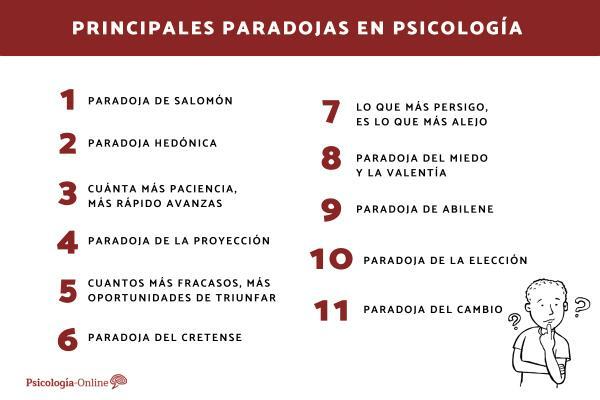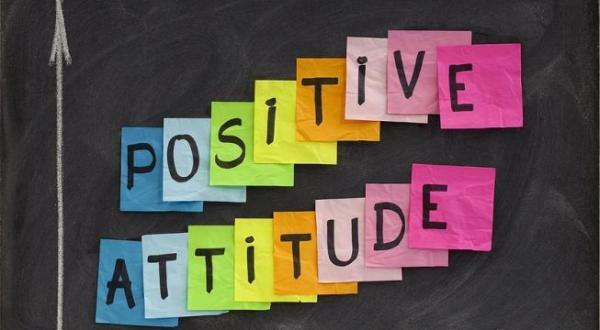
Paradoxes are situations or statements that seem to contradict themselves, but which, in reality, may be true. In psychology, these antilogisms or contradictions are often used to illustrate complex concepts or to challenge preconceived beliefs. That is why many paradoxes have emerged over time that try to explain in a philosophical way some situations that we experience daily.
So that you can learn more about this topic, which is intriguing and at the same time very fascinating, in this Psychology-Online article, we explain what they are. the main paradoxes in psychology and their meaning.
Index
- Solomon's Paradox
- hedonic paradox
- Paradox of patience
- Projection Paradox
- Paradox of failure in real life
- Cretan paradox
- Paradox of effort and result
- Paradox of fear and courage
- Abilene Paradox
- Paradox of choice
- Paradox of change
Solomon's Paradox.
We start with Solomon's paradox, one of the most common, since most people experience it without even being aware that it is a paradox. Solomon's paradox illustrates the situation in which we always want to give life advice to the people around us, but, instead,
The name of the paradox is due to the mythical Jewish king Solomon, known historically as one of the wisest kings and for giving famous advice. However, his personal life was full of bad decisions and he even committed numerous sins.
Almost all of us are used to giving a lot of advice to others, but we make the same mistakes that we try to correct in others. For example, we tell someone to forget about a person who has hurt them, but perhaps we are unable to take that same step ourselves for fear of suffering.
Hedonic paradox.
This paradox comes from the utilitarian philosophical school and is based on the concept that the pursuit of pleasure is the basis for maximizing happiness. In his contributions, psychologist Viktor Frankl wrote: “happiness should not be pursued, it should happen. And it will only come as a byproduct of dedicating yourself to yourself and other people.”
That is, the paradox of hedonism arises from the idea that pleasure is subjective and that what is pleasurable for one person may not be pleasurable for another. This means that It is difficult to know with certainty what things will make us happy, so happiness should not become a daily goal. On the contrary, we should try to enjoy every step of the way.
Furthermore, the deliberate pursuit of pleasure can lead to addiction and dissatisfaction. When we focus too much on pleasure, we can lose sight of other things that are important to us, such as relationships, goals, and the meaning of life.
Example of the paradox of hedonism
The paradox of hedonism can be illustrated with the example of a person who focuses on the pursuit of pleasure and He decides to spend his time living a sedentary life, eating junk food, watching television and playing games. video game. Although these activities may be pleasurable in the short term, In the long term they can lead to health problems, including obesity, social isolation and lack of purpose.
Instead, focusing on other aspects important to him or her, such as relationships, goals, and the meaning of life, can experience more happiness in the long term.
Paradox of patience.
This is one of the most used paradoxes in psychotherapy. The key to understanding it lies in the concept of patience and how it influences our way of acting and facing situations. When we are patient, we are willing to wait as long as necessary to achieve our goals, without rushing or looking for shortcuts. Instead of making impulsive or hasty decisions, we take the time to plan, evaluate and act carefully and thoughtfully.
Through this approach, we avoid making mistakes or taking impulsive actions that could lead us to go back or waste time correcting errors. Instead, we move forward steadily and solidly, allowing us to move more efficiently toward our goals.
Example of the paradox of patience
Imagine that you have bought a piece of furniture to assemble at home. The package comes with an instruction manual and all necessary parts. You are eager to have the furniture assembled and must decide whether to do it as quickly as possible or read the manual carefully. If you start assembling quickly, trusting your instinct and skill, chances are that along the way you will realize that you have placed some pieces in the wrong place, which would make you waste much more time starting the game again. task.
On the other hand, if you decide to read the instruction manual carefully before starting, although it takes a little more time At first, if you follow each step precisely, you will be able to have the furniture ready to go in less time than you expected. wear.
Projection paradox.
The more you hate a person's trait, it may be that you hate it in yourself. The psychologist Carl Jung established that the characteristics of others that bother us can be the reflection of our own internal fears, which he called "Projection." Projection involves attributing to other aspects of ourselves that we do not consciously recognize or accept.
We can exemplify this with the case of a person who always criticizes his friends for being too egocentric and narcissistic. He feels constantly irritated by the attitude of his friends and cannot understand how they can be so egocentricWhat this person does not realize, however, is that they also have egocentric tendencies, but they reject or deny them in themselves.
Paradox of failure in real life.
This is another of the most significant paradoxes in psychology, since it teaches us that as you experience more failures, your opportunities will increase to achieve success. As Thomas Edison put it: “I have not failed. I have found 10,000 ways that don't work. It is a fact that success comes from persistence and overcoming obstacles, and there is no way to avoid the process of learning through failure.
A clear example of this is Michael Jordan, who faced rejection when he was excluded from his high school team and eventually became a world-class player.
Another clear example of the paradox of failure in real life is that of Steve Jobs, co-founder of Apple Inc. In the 1980s, Jobs was fired from the very company he helped create due to differences with the board of directors. This was a big failure in his career and a painful experience. However, instead of giving up, Jobs took this defeat as an opportunity to learn and grow. He founded another company called NeXT Computer and acquired Pixar Animation Studios, which led him to become one of the most successful men in the world.
Cretan paradox.
The Epimenides Paradox, also known as the Cretan Paradox, is a famous self-referential statement that poses a logical contradiction. This paradox It is based on a phrase by Epimenides, a Cretan philosopher and poet from ancient Greece, who stated: "All Cretans are liars."
The center of this paradox arises when we consider whether this statement is true or false. If we assume that this statement is true, then it implies that all Cretans, including Epimenides himself, are liars. However, if all Cretans are liars, this would include Epimenides himself, leading to the conclusion that his claim was false. Therefore, if the statement is true, it contradicts itself.
Example of the Cretan paradox
Suppose someone tells us that he always tells lies. This statement creates a paradox, since, if that person always tells lies, then how do we know if he is telling the truth when he claims that he always tells lies? This paradox illustrates the difficulty of evaluating and understanding our own behavior when it comes to self-reference and self-assessment, as it can lead to apparent contradictions and challenges in understanding the veracity of our own affirmations.
Paradox of effort and result.
One of the most used paradoxes in the field of psychology, since it poses an apparent contradiction between the efforts we make to achieve something and the result we obtain. It can be applied in different contexts, such as personal relationships, professional goals, or any situation in which we strive to achieve something in particular.
The paradox is based on the fact that, sometimes, when we try too hard to reach something or someone, instead of getting closer to it, it seems to move further away. On some occasions, the excessive focus on searching or pursuing something creates a dynamic of desperation or anxiety. This attitude can cause us to act in a desperate or inauthentic way, which distances us from what we are looking for.
Example of the paradox of effort and result
An example of this paradox is a person who constantly seeks the approval of others and tries very hard to please them at all times. However, as he tries too hard to seek approval from others, he may actually push them away as they may perceive his behavior as excessive or inauthentic.
The same thing happens in a romantic relationship, since if one person constantly pursues the other in an overwhelming way, it can generate distance and rejection.
Paradox of fear and courage.
The paradox of fear and courage is based on the idea that bravery does not mean the absence of fear, but the ability to act despite it. In other words, courage arises when we face and overcome our fears instead of avoiding them.
Therefore, if something fills you with fear, it is probably an indication that you should face it. Enjoyables that involves real danger to life or causes physical harm, the feeling of fight or flight is usually activated when we We encounter challenges related to past trauma or when we seek to realize our vision of the self that we have. we aspire to be.
For example, striking up a conversation with someone attractive, taking the initiative to look for a new job directly, expressing yourself in public, starting a business, expressing controversial opinions, being completely honest with someone, and many other similar situations often trigger fear and anxiety. However, it is important to recognize that these are precisely the things we must address and confront in order to move forward in life.

Abilene paradox.
The Abilene Paradox illustrates a situation in which a group of people decide to take an action that no one wants, but they do it because they believe that it is what others want and they do not intend to cause inconvenience. This is one of the paradoxes that most often occurs in social groups and is produced by lack of effective communication and the presumption of what others want.
The Abilene Paradox was described by psychologist Jerry B. Harvey in his 1988 book titled The Abilene Paradox and other Meditations on Management. Harvey used the example of a family that decides to go to Abilene, a remote town in Texas, to spend the day. The family doesn't want to go to Abilene, but no one wants to be the first to say no. As a result, the family makes a decision that is not what the majority of its members want.
Let's imagine that a group of friends is trying to decide where to go to dinner. They all prefer to stay at home, but no one wants to look bored, so one suggests going to a restaurant. The others nod, thinking that's what everyone else wants, and they end up going out to dinner, although none of them really wanted to.
Paradox of choice.
When we have too many options to choose from, we may find it more difficult to make a decision. This is because the brain has to process more information and take more considerations, which can cause anxiety and confusion.
Psychologist Barry Schwartz found in his studies that those with more options to choose from were less happy with their decisions than those with fewer options. The study also found that people who had more options were more likely to regret their decisions. It is common for so many alternatives to cause anxiety due to the fear of making a mistake in the elections.
Example of the paradox of choice
Imagine that you go to an ice cream shop. If there are only three flavors (vanilla, chocolate and strawberry), the choice is easy. You choose one based on your preference and you'll probably be happy with your decision.
However, if there are 50 different flavors, the decision can be overwhelming, as the wide variety makes making a decision much more difficult. Finally, after choosing a flavor, you may be left wondering if you really made the best choice or if another flavor would have been better. This uncertainty and questioning can make the final choice less satisfying, despite having many more options at your disposal.
Paradox of change.
The paradox of change illustrates a psychological phenomenon that occurs when change is inevitable, but, at the same time, it is difficult to achieve. This is because change requires us to abandon what we know and experience something new.
A study by psychologist Martin Seligman found that people who are more open to change tend to be happier and more successful. The same study also found that people who they resist change They tend to be more prone to anxiety and depression.
As an example, imagine someone who has a job that they don't like, but it provides them with financial security. That person knows that changing jobs could be beneficial in the long term, however, fear of the unknown and uncertainty can make it difficult for them to make the decision to change.

This article is merely informative, at Psychology-Online we do not have the power to make a diagnosis or recommend a treatment. We invite you to go to a psychologist to treat your particular case.
If you want to read more articles similar to The main paradoxes in psychology and their meaning, we recommend that you enter our category of Social psychology.
Bibliography
- Kahneman, D. (2003). Paradoxes of human behavior. Barcelona: Ariel.
- Pérez-Luco, R., Alarcón, P., & Zambrano, A. (2004). Human development: paradox of the stability of change. Psychosocial Intervention, 13(1), 39-61.
- Pinker, S. (2002). Paradoxes of the mind. Barcelona: Paidós.
- Wiseman, R. (2005). Paradoxes of psychology. Barcelona: Ariel.


